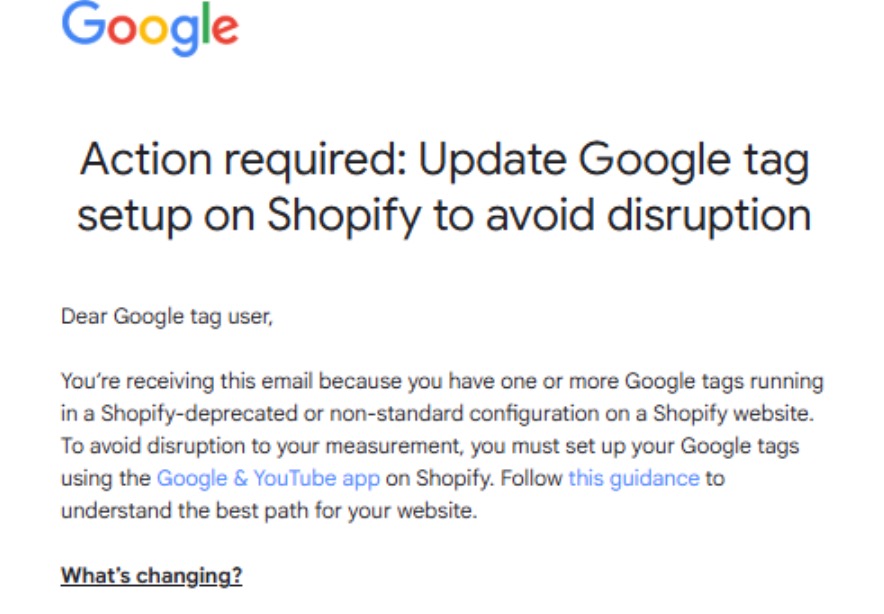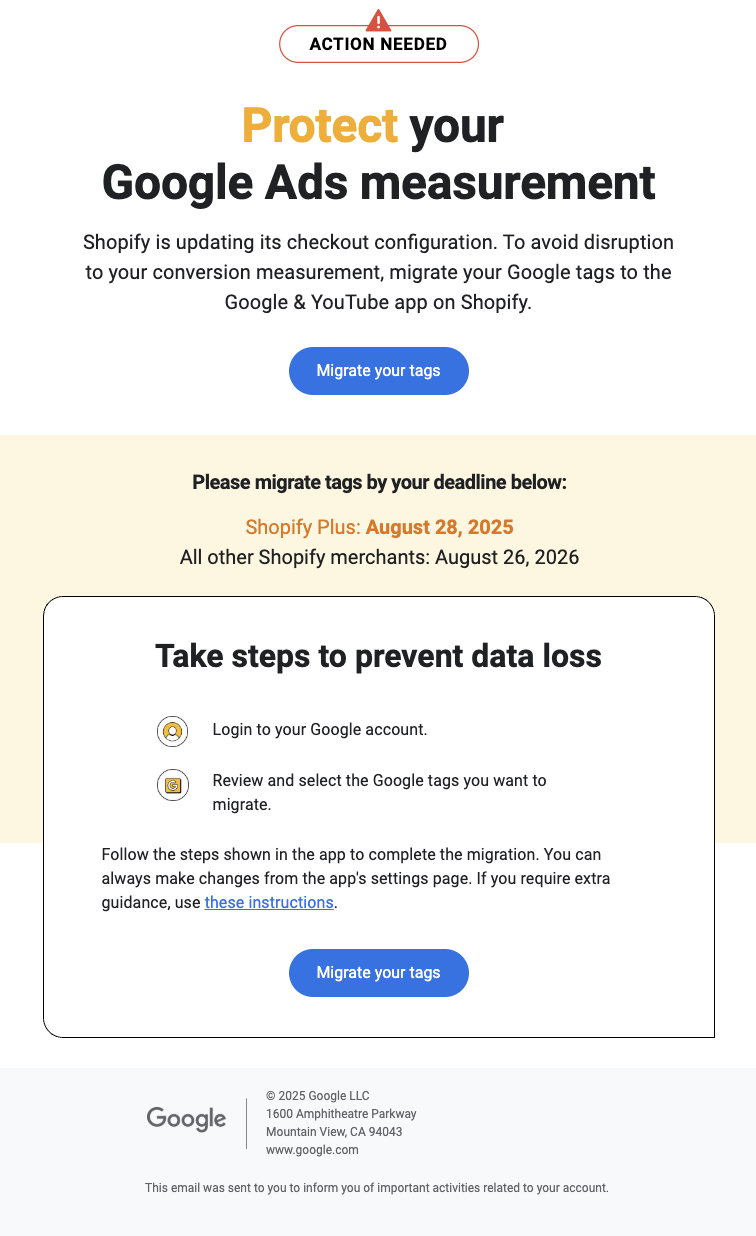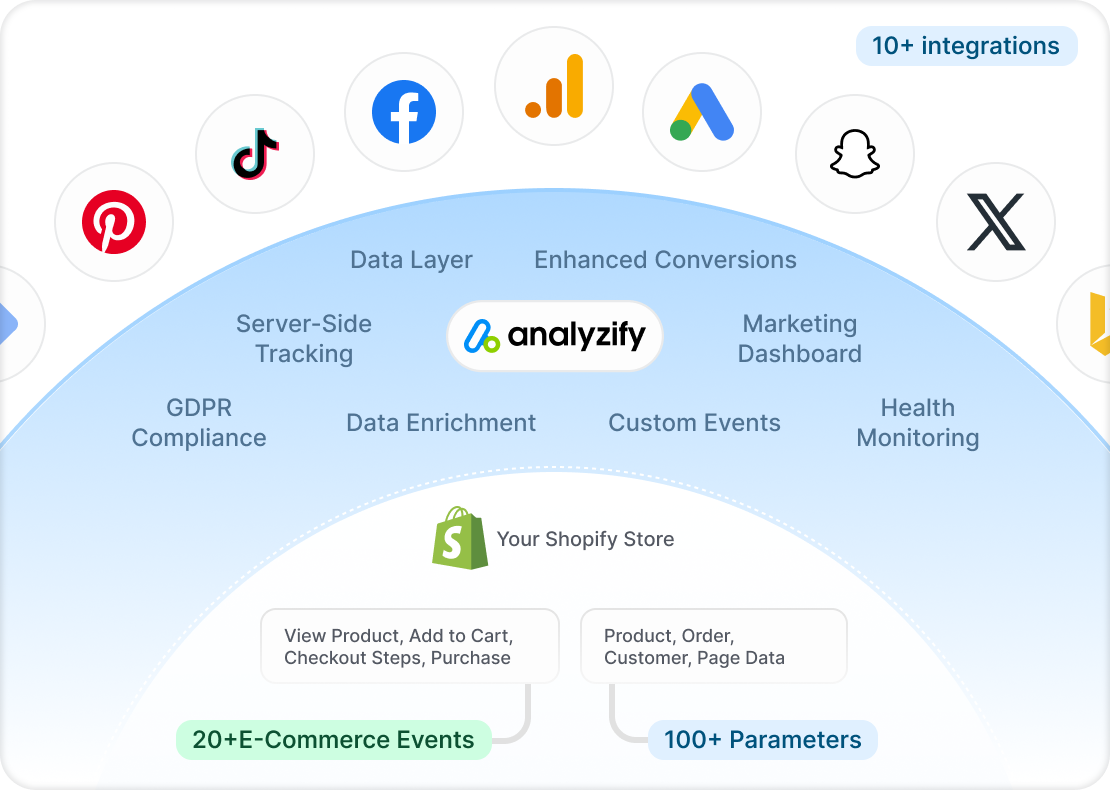First Google and now Shopify have begun notifying merchants about some changes that might affect how Google tags can be added to Shopify stores.
Google started by sending an email with “Update Google tag setup on Shopify to avoid disruption” title, saying:
“You’re receiving this email because you have one or more Google tags running in a Shopify-deprecated or non-standard configuration on a Shopify website. To avoid disruption to your measurement, you must set up your Google tags using the Google & YouTube app on Shopify. Follow this guidance to understand the best path for your website.”
More recently, Shopify has also placed a banner to warn merchants with similar concerns:
“Migrate your Google tags to prevent data loss. Shopify is making changes that will affect how your Google tags work. Migrate your Google tags to Google & YouTube app to avoid data loss and service disruption. After migrating, remove duplicate tags from other places in your Shopify store to avoid inaccurate report data and problems with ad optimization.”
You should note that if you’re using Analyzify with an updated setup, you’re already covered – our implementation is always fully compatible with Shopify’s new requirements & updates.
You will explore why & how below. But here’s what’s happening and what you need to know in the first place.
“Update Google tag setup on Shopify to avoid disruption” in A Nutshell

- Shopify is updating its checkout experience, affecting how Google tags (or any other pixels) work on “Thank you” and “Order status” pages
- Google is warning merchants with outdated tracking setups that their conversion tracking will stop working
- Merchants must migrate their Google tags in order to preserve their tracking and stop loss of conversion data
- Analyzify clients (especially those set up after January 2024) are already compliant and don’t need to take action
Understanding Shopify’s Recent Warning: “Migrate your Google tags to prevent data loss”
 In essence, Shopify’s warning has the same core message as Google’s. The notice clearly states that:
In essence, Shopify’s warning has the same core message as Google’s. The notice clearly states that:
- Changes are coming to how Google tags function within Shopify
- Migration to the Google & YouTube app is Shopify’s recommended solution
- Merchants should remove duplicate tags to prevent data discrepancies
Google’s Latest Warning: Protect your Google Ads measurement

Following the initial warnings, Google has sent yet another email to merchants:
“Shopify is updating its checkout configuration. To avoid disruption to your conversion measurement, migrate your tags to the Google & YouTube app on Shopify.”
This is simply Google being more proactive about the same issue we’ve already covered.
While these repeated warnings might seem concerning, they’re just part of Google’s effort to ensure all merchants are aware of the upcoming changes well before the deadlines.
The core message remains unchanged, and if you’re using Analyzify, you’re still fully protected.
What’s Changing with Shopify’s Checkout
Both Google and Shopify are sending “Update Google tag setup on Shopify to avoid disruption” warnings because Shopify is deprecating several methods previously used to implement Google tags on checkout and post-checkout pages:
- Checkout.liquid customizations (for Shopify Plus merchants)
- “Order status page additional scripts” feature
- Legacy Google Analytics integrations
As Shopify rolls out its enhanced checkout experience, these older implementation methods will no longer function, resulting in lost conversion tracking data.
Important Deadlines
- Shopify Plus merchants: Must migrate by August 28, 2025
- Non-Plus merchants: Must migrate by August 26, 2026
Google recommends early migration to ensure your tracking history and ad performance remain uninterrupted.
Delaying this can significantly impact your customer reach and reduce the effectiveness of your campaigns and bidding strategies.
How Analyzify Protects Your Tracking

Analyzify takes care of these changes and ensures your tracking remains fully operational through:
- Modern Integration Methods: Analyzify uses Shopify’s latest APIs and Web Pixels framework, making it compatible with all checkout updates.
- Checkout Extensibility Support: Analyzify is fully compatible with Checkout Extensibility, ensuring seamless tracking regardless of checkout customizations.
- Comprehensive Coverage: Our tracking captures all critical e-commerce events, including checkout steps and purchase confirmations.
- Regular Updates: We continuously adapt to Shopify’s platform changes, often implementing solutions months before migration deadlines.
About Custom Pixels: Why Analyzify Users Should Not Be Concerned
In some documentation shared along with these warnings, Google has raised concerns about the limitations of Shopify’s custom pixel implementation, stating:
“Running Google tags inside Shopify’s custom pixel feature is not a supported implementation. Due to limitations of this environment, Google cannot guarantee the behavior of Google tags that are implemented using a custom pixel.”
However, you have no reason to worry about that.
The custom pixel concerns raised by Google might primarily affect DIY implementations or less sophisticated integrations that don’t account for Shopify’s unique environment.
Analyzify is specifically engineered for Shopify to deliver accurate, complete data by embracing the latest tracking technologies recommended by Shopify.
Learn more: Google’s warning on Shopify Custom Pixels.
Should You Be Concerned If You Get “Update Google tag setup on Shopify to avoid disruption” Mail?
You might need to take action if:
- You’re using tracking implementations outside of Analyzify (hard-coded snippets or other apps)
- You’ve received a specific email from Google identifying affected tags on your store
- You’re using Google Tag Manager alongside custom checkout.liquid modifications
Google is proactively sending emails to merchants with problematic implementations. These emails specifically identify:
- The affected website domain
- The specific Google tag ID(s) that need migration
- The migration deadline based on your Shopify plan
If you receive such an email despite using Analyzify, it likely indicates you have additional tracking implementations outside of our app.
Action Plan for Merchants
For Analyzify Clients:
Setups After January 2024
No action needed – you’re already protected with Analyzify. If you still receive such emails, you might have other tracking issues.
Analyzify v3.3 - Before January 2024
If you are still using this outdated version of Analyzify, you likely get such emails. In this case, you need to update your setup.
For Non-Analyzify Merchants
- Migrate your Google tags with the Google & YouTube app
- Consider switching to Analyzify for more comprehensive, reliable, and worry-free tracking
- Plan migration well before deadlines to avoid conversion tracking disruptions
The Benefits of Analyzify’s Approach
Analyzify offers several advantages over the basic Google & YouTube app:
- More Complete Data: Track additional e-commerce events and parameters missing from the default Google integration
- Enhanced Metrics: Capture product IDs, variant IDs, collections, coupon codes, and more
- Cross-Platform Support: Track data across multiple marketing platforms
- Server-Side Tracking: Secure enhanced server-side tracking for GA4(purchase event), Meta (Facebook), and TikTok
- Expert Support: Receive guidance from specialists who understand Shopify’s tracking nuances
- Future-Proof Solution: Stay ahead of platform changes with regular updates
Shopify’s evolving checkout experience is improving the merchant and customer experience, but it requires careful attention to tracking implementation.
With Analyzify, you can navigate these changes confidently, knowing your essential conversion and analytics data remains accurate and uninterrupted.
If you’re already using Analyzify with our recommended implementation, you can rest assured your tracking will continue working seamlessly through Shopify’s checkout changes.
Contact us if you have further questions.
































